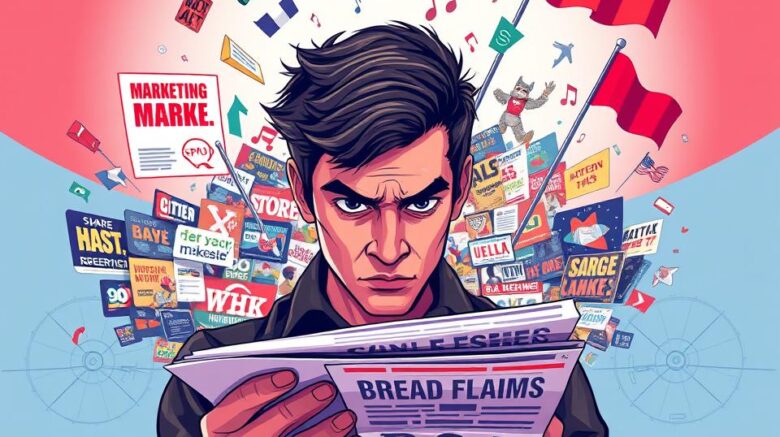1on1 Marketing: Unveil Tailored Customer Engagement.
Ever ponder why some brands connect deeply with their audience while others falter? The answer is 1on1 Marketing, a revolutionary approach that transforms generic marketing into personalized experiences. By dialing into personal preferences, it forges a bond that mass marketing simply can’t replicate. It redirects the focus from one-size-fits-all messaging to tailored tactics that speak directly to each customer’s core.
When companies embrace 1on1 Marketing, they establish deeper connections. They can craft marketing plans that truly resonate with their audience. Here, we delve into the essence of 1on1 Marketing and how it allows brands to engage with customers individually, 1 on 1.
How Marketing Strategies Have Transformed
The marketing landscape has seen a significant transformation over the years. At first, marketers deployed broad-brush strategies aimed at average customers. Now, the demand is for engagement through bespoke conversations. This shift emphasizes the need to understand each customer as an individual, not just part of a group.
As marketing evolved, it became clear that generic approaches were no longer effective. Modern strategies aim to create meaningful interactions, building relationships instead of just pushing products. By leveraging data insights, marketers shift to tactics that address each customer’s unique preferences.
Such evolution not only strengthens customer bonds but also boosts loyalty and retention. In today’s choice-saturated market, brands offering personalized journeys stand apart. They create platforms for dialogue and engagement, ensuring customers feel valued.

| Strategy Type | Characteristics | Example |
|---|---|---|
| Generic Approach | Mass targeting, general appeal | Mass email blasts |
| Personalized Engagement | Customized dialogues, precision targeting | Custom product suggestions |
Personalization’s Role in B2B
As B2B marketing evolves, personalization becomes indispensable. Marketers aim to boost conversion rates through personalized 1:1 marketing. Research indicates that many view this as critical for retention. In a rapid-fire environment, engaging audiences effectively is crucial.
Personalized marketing tackles the challenge of grabbing attention. It ensures content resonates with each customer’s unique preferences. This focus on individual experiences helps brands stand out in crowded markets.
The rise in customer touchpoints has heightened the need for personalized engagement. Companies embracing tailored tactics meet needs and forge lasting bonds. Such an approach offers a distinct advantage in today’s market.
Understanding 1on1 Marketing
One-to-one marketing is about tailoring experiences to meet each customer’s unique needs. It uses data insights to craft personalized engagement strategies. By concentrating on individual experiences, it creates robust customer bonds.
Imagine a cafe where the barista remembers your go-to order—this is one-to-one Marketing in action. This simple gesture demonstrates how attending to preferences bolsters satisfaction. It turns a simple transaction into a memorable experience, building loyalty.
Implementing one-to-one Marketing requires a deep dive into customer data. They analyze behaviors and preferences to craft messaging. This guarantees marketing efforts hit the mark with distinct tastes, yielding stronger connections and greater satisfaction.
As companies pursue personalized engagement, they recognize that customization underpins lasting success. Those mastering bespoke experiences gain substantial rewards.
Benefits of Personalized Customer Engagement
Personalized customer engagement brings numerous benefits to modern brands. It significantly increases satisfaction by delivering experiences that align with individual needs. Research reveals that 80% of consumers favor brands offering customized interactions. This highlights the significant impact of customized marketing.
Personalized loyalty programs boost retention. By addressing specific pain points and preferences, businesses create an environment where customers feel valued and understood. This connection fosters repeated purchases, driving profitability.
Tailored marketing yields better conversion rates. Custom suggestions and targeted messaging guide customers from consideration to purchase. Highlighting the benefits of personalized marketing enhances brand perception and positions businesses for success in a competitive market.
| Benefit | Description | Impact |
|---|---|---|
| Customer Satisfaction | Personalized experiences enhance overall customer happiness. | Higher chances of repeat purchases. |
| Rewards Tailored to You | Custom offers increase customer engagement. | Enhanced retention and brand loyalty. |
| Conversion Rates | Targeted content drives customer actions effectively. | Boost in sales and revenue. |
Hurdles to Personalized Marketing
Brands face numerous hurdles when aiming to implement personalized marketing. One major challenge is the complexity of data collection. High-quality data is key for segmenting audiences effectively. Without this, campaigns miss the mark, squandering opportunities and resources.
Companies must balance personalization with broad messaging. Big enterprises struggle to keep a personal touch amid heavy automation. This risks eroding the personal connection customers value. – 1on11on1 Marketing
Smaller businesses also have their own set of challenges. They may lack clear messaging, limiting their personalization efforts. Acknowledging these hurdles is crucial for refining strategies and boosting engagement.
Tools Fueling Personalized Marketing
Innovative tech is reshaping personalized engagement. Customer Relationship Management (CRM) systems stand out as a key component. They handle data, essential for crafting bespoke experiences. A strong CRM enables deeper insight into preferences and behaviors.
AI amplifies personalization with precise targeting and automation. ML algorithms analyze large datasets to reveal trends and behaviors. This enables strategy refinement. Automation reduces manual effort and optimizes campaign impact.
Studies reveal that 72% of marketers focus on CRM systems for personalization. Marketing automation tools are used by 55% to streamline campaigns. These technologies empower businesses to offer customized experiences on a large scale. This ensures marketing efforts connect with individual consumers, avoiding generic messages.
Merging these tools creates a dynamic engagement framework. The fast-evolving scene drives adoption of cutting-edge tech. These tools not only improve efficiency but also strengthen connections with their audiences.
Top Tips for Effective Personalization
Effective personalized marketing hinges on key best practices. These ensure that efforts resonate with the audience, leading to better engagement. The core elements include:
- Audience segmentation is essential for targeting specific groups based on common traits. It enables precision messaging, increasing engagement rates.
- Using optimized messaging improves the customer experience. Uniform, relevant messaging across platforms builds trust and fosters ongoing engagement.
- Adopting testing strategies, like A/B testing, is critical. It helps pinpoint the most impactful marketing approaches by comparing different messages and metrics.
Utilizing customer data is vital for understanding their behaviors and preferences. Marketers should regularly analyze this data to refine their strategies. Following these practices enables brands to develop personalization that truly resonates with their audience.
Creative Tactics for Personalized Marketing
Creative marketing strategies are key to improving personalized experiences at every customer touchpoint. Brands now use personalized emails that match individual tastes, making messages more impactful. Analyzing purchase history allows spot-on product suggestions, increasing sales.
Segment-specific videos are another smart tactic. They capture attention and forge emotional bonds with viewers. Adaptive loyalty programs that align with behaviors reward meaningful interactions, enhancing the journey.
| Creative Tactic | Description | Benefit |
|---|---|---|
| Personalized Emails | Emails designed to individual preferences and behaviors. | Boosts engagement and conversion rates. |
| Product Recommendations | Suggestions based on previous purchases and browsing history. | Enhances sales and customer satisfaction. |
| Tailored Videos | Video content designed for specific segments. | Strengthens brand connection and engagement. |
| Loyalty Programs | Rewards systems that adapt to individual behaviors. | Drives loyalty and repeat business. |
Companies benefit by weaving customized offers into social media, email, and app alerts. Every touchpoint is an opportunity to showcase commitment to personalized engagement. It creates memorable experiences, making brands stand out in a crowded landscape.
What’s Next for One-to-One Marketing
The world of 1on1 marketing is rapidly changing, driven by the latest marketing trends. AI will fuel campaigns tailored to individual requirements. This approach boosts marketing success and builds stronger customer connections by delivering the right content at the right time.
Omnichannel experiences are another major trend. Customers now expect a smooth journey across different platforms, from social media to emails. Brands must ensure consistent messaging to meet these expectations. Knowing interaction points helps craft a cohesive journey, enhancing loyalty.
Adapting to these shifts, ethical data practices will become essential for maintaining trust with consumers. With growing concerns over data privacy, marketers must be transparent and responsible with data. Focusing on ethical data usage not only meets regulatory standards but also builds stronger customer relationships, leading to increased loyalty in the future of 1on1 marketing.
